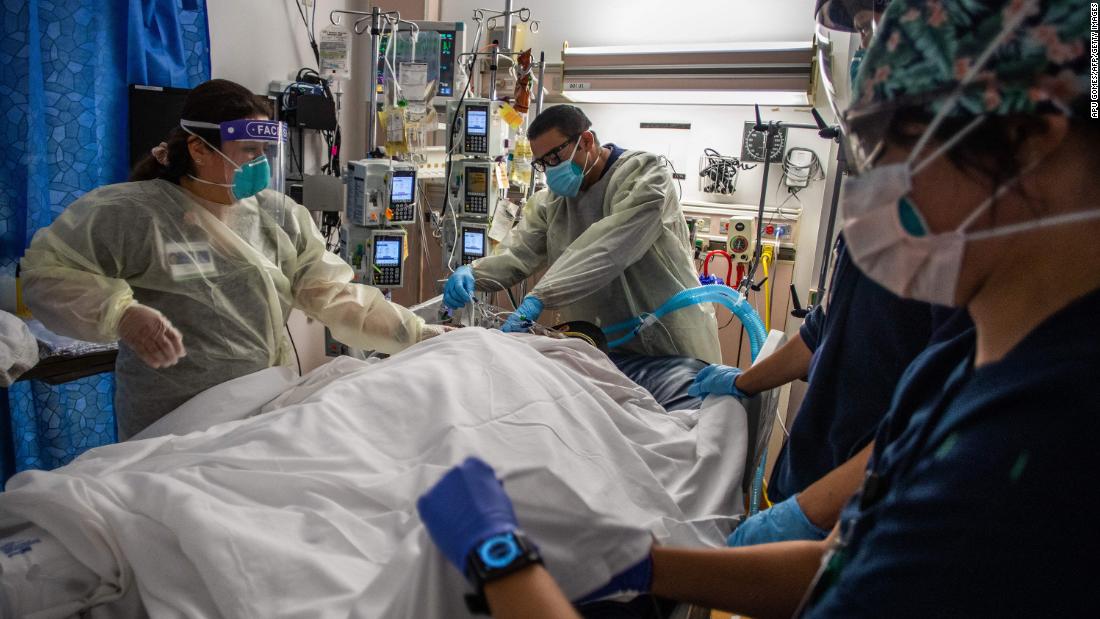
(CNN)For fully vaccinated Americans, the risk of being hospitalized or dying from Covid-19 is low -- much lower than the risk for unvaccinated people. But in those rare cases when a fully vaccinated person gets infected, data suggests it's older adults and those with multiple underlying medical conditions who are most at risk of serious illness.
As of August 30, the US Centers for Disease Control and Prevention has received reports of 12,908 severe breakthrough cases of Covid-19 among fully vaccinated people that resulted in hospitalization or death. For the more than 173 million people who were fully vaccinated by that date, that represents a less than a 1 in 13,000 chance of experiencing a severe breakthrough case of Covid-19.
About 70% of breakthrough cases resulting in hospitalization were among adults 65 and older and about 87% of breakthrough cases resulting in death were among adults 65 and older, the CDC data suggests.
This CDC data is based on voluntary reporting from states and may be incomplete, but multiple studies suggest similar trends.
Unvaccinated adults in the United States are 17 times more likely to be hospitalized for Covid-19 than fully vaccinated adults, and patients hospitalized with a breakthrough case tend to be older and more likely to have at least three underlying medical conditions, according to a preprint study the CDC posted last week.
Among vaccinated adults with breakthrough cases that put them into the hospital, the median age was 73 and about 71% had three or more underlying conditions, including diabetes, heart disease, autoimmune conditions and others.
Unvaccinated patients hospitalized with Covid-19 had a median age of 59 and about 56% had three or more underlying conditions, the study found.
From late June through late July, a period when the Delta variant accounted for at least half of all Covid-19 cases, unvaccinated adults in the US were about 10 times more likely to be hospitalized for Covid-19 than fully vaccinated adults, the CDC study found.
Both overall and since Delta has been the prevalent variant, the risk of hospitalization was greater for unvaccinated adults in all age groups, but the risk gap is especially large among adults under 50.
The CDC analyzed 4,700 hospitalizations among adults between January 24 through July 24 through the COVID-19-Associated Hospitalization Surveillance Network (COVID-NET), which tracks laboratory-confirmed Covid-19 associated hospitalizations in 99 counties in 14 states representing about 10% of the US population. The study has not yet been peer-reviewed or published.
Another study also found elderly people with underlying conditions accounted for most severe breakthrough cases.
"Identifying who is more likely to develop severe COVID-19 illness after vaccination will be critical to ongoing efforts to mitigate the impact of these breakthrough infections," Dr. Hyung Chun, associate professor of cardiology at Yale School of Medicine, said in a statement about a study his team published Tuesday. "These cases are extremely rare, but they are becoming more frequent as variants emerge and more time passes since patients are vaccinated."
Chun and his colleagues studied close to 1,000 patients hospitalized for various causes between the end of March and July of this year, about 18% of whom had received at least one dose of Covid-19 vaccine and about 6% of whom were fully vaccinated.
Their research -- which took place before the Delta variant dominated cases in the United States -- found the median age of those with severe Covid-19 symptoms was 80, more than half were overweight. Most had cardiovascular disease, half had lung disease and half had diabetes.
Half of the people in the study who tested positive for coronavirus did not have any symptoms of the infection and were in the hospital for something else altogether.
"It's clear that the vaccines are highly effective, and without them we would be facing a much deadlier pandemic," Chun said. "As effective as the vaccines are, with emerging variants and increasing cases of breakthrough infections, we need to continue to be vigilant in taking measures such as indoor masking and social distancing."
The demographics of those who are experiencing severe breakthrough cases of Covid-19 are similar to those who are at risk of a severe infection generally, Dr. Peter Hotez said to CNN's Kate Bolduan Wednesday.
Get CNN Health's weekly newsletter
Sign up here to get The Results Are In with Dr. Sanjay Gupta every Tuesday from the CNN Health team.
"I think what's happening is the vaccinations may be showing greater waning of immunity over time in those (high risk) populations and that may be the reason for it. That's why, for instance, Israel, when they first announced their booster plan to give a third immunization, they focused more on older individuals," said Hotez, a vaccinologist and dean of the National School of Tropical Medicine at Baylor College of Medicine.
But in terms of curbing the epidemic, the focus should be on reaching the unvaccinated population, he said.
"For this Delta variant, it's so highly transmissible, we have to get to 85 to 90% of the whole population vaccinated. So we've got to figure out a way to reach those holdouts," Hotez said.
"condition" - Google News
September 09, 2021 at 03:27AM
https://ift.tt/3yZZAOt
Risk of severe breakthrough Covid-19 higher for seniors and people with underlying conditions - CNN
"condition" - Google News
https://ift.tt/2W6ON50
https://ift.tt/2L1ho5r
Bagikan Berita Ini

















0 Response to "Risk of severe breakthrough Covid-19 higher for seniors and people with underlying conditions - CNN"
Post a Comment